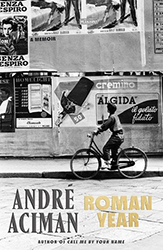This entertaining collection of comedy sketches offers the reader a glimpse into the world of the Egyptian Jewish diaspora. The son of a Sephardic mother and an Ashkenazi father, Canadian writer Aaron Zevy recalls the humorous, often exaggerated family memories particular to his Sephardic side. His mission is “to tell a good story,” and he often succeeds.
The author’s self-deprecating humor is reminiscent of Gary Shteyngart’s. His schleppy persona introduces us to a little-known Sephardic subculture in Montreal. He often seems concerned about fitting in, and about his friends meeting his unusual and quirky family.
Zevy describes Sephardic food obsessions, the sheer number of languages used within one sentence (Arabic, French, English), and his family’s nostalgia for Cairo despite the fact that they were expelled from Egypt “for the second time” — a reference to Exodus.
Zevy is on a mission to extract details from his immigrant parents and relatives. He explains that his family left Egypt after the 1956 Suez Crisis. “Everyone, it turns out, was fired on the same day. Their bank accounts were frozen and my Tante Liliane did spend some time in prison. My father, though born in Egypt, was Ashkenazi and somehow managed to land himself a passport … Perhaps it is the passage of time but none of their stories were told with any bitterness. If anything, they all remembered their life in Egypt as halcyon days. It had been a place which was good for the Jews. And then it wasn’t.”
“Home Made Cake,” an essay about a famous bakery in the Cairo suburb of Heliopolis, is a standout. As a child, Zevy used to hear his parents, aunts, and uncles swoon over the fantastic French pastries — especially the éclairs — they used to buy at a place Zevy knew only as “Om Met Kek.” “Pronounced very quickly,” he writes. “With no pause between each word … It sounded like all the other Arabic names and expressions.” Zevy continues: “Every time they spoke about the patisserie on rue Ismaili Pasha I never, not once, heard the words Home Made Cake. Only Om Met Kek.”
In “Hanono,” Zevy relates how he used to play poker in Hallandale, Florida with his late uncle “and his crew of octogenarian Egyptians. So while I did not know how to speak Arabic, I could play poker in Arabic.… a really lousy hand earned the Arabic designation of a ‘khara’ — just shit.”
While not all twenty-five vignettes are equally engaging, this collection delivers some good laughs as well as insights.
Nina Schneider, MFA, is a writer and retired English and Media Studies professor based in the Boston area.





